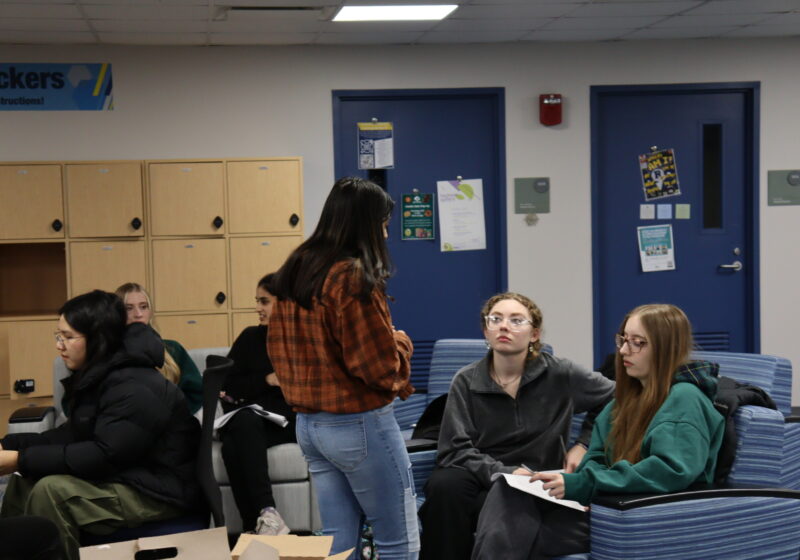If you thought the Students’ Association Government (SA) was ineffectual and unreliable before, then get ready to be disappointed further. This year’s presidential tickets have a worrying history of a lack of effort, meaning that next year’s Senate will have to step up and dedicate their time to making the UR experience as good as possible for students, faculty, and staff alike.
The SA President has more advocacy power than any other student as they are able to get into administrative spaces that others are unable to reach, and have the ears of the highest levels of University administration.
This year’s presidential tickets include first-years Ben Silverberg with Samantha Siegel and junior John Conduah with sophomore Sammy Randle III.
While each ticket champions important initiatives, they also exhibit a history of being absent and ineffective. Much like in our national government, the solution for weak or unprepared executives in SA must be a strong, active legislative body. No matter who wins the presidency, the Senate will be crucial in stepping up to be the advocates the student body deserves.
The Silverberg-Siegel Ticket
Silverberg and Siegel claim that the student government “doesn’t take itself seriously” on their official platform. As it happens, this ticket is composed of two sitting senators who contribute to that unseriousness.
Silverberg sits on the Administration & Review Committee (ARC) and the SA Appropriations Committee. His primary responsibility all year has been to attend Student Organization Review Board (SORB) meetings and deliver updates to Senate, but those updates have instead been frequently delivered by other SA members on SORB, including junior Campus Life Co-chair Kaitlyn Yelencsics.
Siegel joined the Campus Life Committee this past October as a legislative advisor and later as a senator since Jan. 27 — an incredibly popular committee placement. Many of the goals of the Silverberg-Siegel ticket have to do with the kinds of projects Campus Life takes on, including expanding Danforth’s breakfast hours, lowering Hillside costs, transportation reform, and reinstating Rocky Bucks to Grubhub. These are all projects Siegel, in her previous roles, could have started working on.
SA has already passed a number of bills this year aimed at organizational change — another priority of this ticket — and neither have been involved in planning, writing, or debating the changes.
At the SA presidential debate April 3, Silverberg and Siegel touted transparency — a trait that they have not exhibited in their time in the Senate. For example, despite Siegel mentioning her work on the Red Watch project, there were few mentions of it in the Campus Life Committee minutes. Since its introduction Feb. 14, it has only been mentioned five times, two of those mentions simply being requests for updates. The first meeting regarding Red Watch was announced for April 4 — the day after the SA presidential debate.
When asked about the number one issue on campus at the debate, Silverberg claimed that dining took the cake — a wholly unsatisfying answer given the backdrop of grants being removed; Diversity, Equity, and Inclusion (DEI) being under attack from all sides; and international students being threatened with deportation almost daily.
The Conduah-Randle Ticket
Conduah and Randle have comparatively less student government experience, and as the SA presidency and vice presidency are the two most demanding roles in SA, their intricacies cannot be learned entirely in one year — especially if the people in those roles want to be effective.
As DEI Chair, Conduah had the responsibility of planning the third annual Identity Week, a tradition that celebrates the diversity of cultures on campus. This year’s Identity Week featured fewer events than normal, and the events they did host were poorly planned by all organizations involved, with Friday’s Cultural Fair nearly running out of food after a mere 45 minutes.
Conduah has been the chair of the DEI Committee since Jan. 27 of this year, and has admittedly done the valiant work of rebuilding the committee after its unfortunate mid-year decline.
The anxieties around Randle stem from his lack of SA experience. The Conduah-Randle ticket promises many initiatives, including protecting minority and LGBTQ+ rights, clarifying conduct policies, and increasing accessibility. However, Randle’s only SA role has been as an ARC Analyst: someone who sits on the committee that reviews student organizations under WCSA. Outside of this role he has no other experience working in student government.
So What Comes Next?
In light of that probable lack of commitment next year, it falls to Senate to shore up the gaps that will likely be left by their executive leadership. An important way for them to do that is by fully utilizing the powers available to them in their roles.
When working as intended, ARC is meant to review student organizations. When ARC representatives do not put in the time, it gets harder to form new clubs, gain access to resources for existing ones, and overall hinder the success of clubs on campus.
E-boards across campus can attest to the fact that organizational assistance could be much better, and many have come to Senate with ideas on how to improve club life, such as performance space reform or making current resources centralized and more visible — all initiatives an effective Senate could easily take on.
The committee structure allows SA to delegate specific issues to specific groups of people, giving them the expertise to effectively make change in those areas. SA is also well aware of the issues students want us to champion. An effective Senate will, like it once did, hold regular meetings with administrators, conduct in-depth research on our peer institutions (data that has significant sway with administration), and write and pass legislation that highlights these findings and signifies unified student support. The key is not just doing the job, but doing it early and consistently, not at the end of the year.
Senate can also improve by keeping up communication with the student body. While the SA president has the ability to send campus-wide emails whenever they think necessary to provide updates and speak their mind, Senate also has the ability to speak on anything it wants through passing statements and resolutions that come from the entire body. This ability is one we rarely use.
Historically, one of the top criticisms of SA is our speed: We have not responded to critical issues fast enough. An effective Senate will have senators in all areas of campus who see these issues and quickly write legislation addressing them. They will also be able to recognize solutions and fold them into their committee work.
Silverberg and Siegel do have a point. For the past year, SA has reckoned with a largely unserious, unmotivated, and ineffective Senate that doesn’t take advantage of what it can do for students. What undercuts their argument is the fact that both Silverberg and Siegel have contributed to that environment. Given the executive tickets this election, the time is now to pressure the Senate into action.
Many of the initiatives in both tickets are valid and important causes, and it will be up to a strong, experienced, independent, and willful Senate to get them done. The nature of the Senate gives it the gift of sheer manpower. With an ineffective executive branch, the legislative branch will need to divide and conquer to affect change. It will need to take the meetings the president doesn’t attend, talk to the student body in ways the president won’t, and pass more legislation than the last two years combined.
It’s no secret that people often feel SA is ineffective and is difficult to join, but the results of their work are directly reflected by the effort people put in. The more pressure placed on SA and the more effort members put in, the greater impact they will have. I hope whoever is president next year will prove me wrong and create the change they promise, but if they don’t, it will be up to Senate to push through the change that students deserve to see.
Editors note: The Campus Times does not endorse any candidate.





